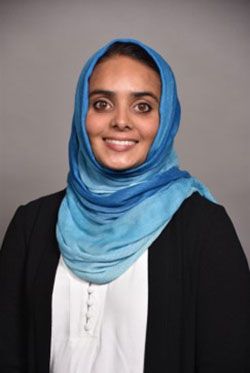Studying Healthcare Systems Engineering as a grad student propelled pharma consultant Zara Ali Ahmad ’16 ’18 M.Eng. into a fast-paced profession she’d never considered
Zara Ali Ahmad always thought she’d become a physician’s assistant. But as she entered her senior year majoring in behavioral neuroscience at Lehigh University, she was still keeping her options open.
Having heard good things about Lehigh’s Healthcare Systems Engineering (HSE) professional master’s program, Ahmad took two prerequisite classes during her final undergraduate semester—a decision that propelled her to follow a path outside of medical studies.
Lehigh’s Healthcare Systems Engineering program is a 30-credit track in the P.C. Rossin College of Engineering and Applied Science that teaches students systems engineering tools and methodologies and how to apply them to the complex and often fragmented environment of health care delivery.
“It was the best educational experience I’d had,” she explains.
Ahmad says her M.Eng. degree led her to a profession that wasn’t on her radar—working as a consultant in pharmaceutical and life sciences for global giant PricewaterhouseCoopers.
It’s a fast-paced job that has Ahmad crisscrossing the U.S. and Europe to meet with clients and review their operations.
“Every day is different,” she says. “I like to be on my toes and feel productive.”
Ahmad grew up on Long Island, and is now based in PwC’s New York City headquarters. She works on teams ranging from two to 50-plus members and helps clients save costs through procurement contracts that buy materials centrally for companies rather than for individual sites or projects.
For one company, she used in-house value capture analysis to identify more than 20 ways the company could save a projected $22 million annually.
In the case of a medical device manufacturer, she looked at all 9,000 parts the company made—and the machines used to make them—to find ways to optimize operations as the company prepared to be acquired by a new owner.
“They got a bigger bang for their buck,” Ahmad says. “And for the buyer, they bought a better company, one that had more value and would return more value in the future.”
Looking back, Ahmad admits she never saw engineering in her future.
“Calculus was not my strong suit, but I quickly realized that the math involved in the HSE program would not deter me, as there was so much more to learn,” she says.
Ahmad liked that the HSE classes were small and taught by engaging professors, many of whom had worked in health care.
“They were able to pull from their experiences and give us those real-world examples and scenarios, and relate them back to what we were learning,” she says.
She found the foundational courses in industrial and systems engineering particularly helpful in learning about supply chain management, simulation modeling, process improvement, and optimization.
“I’m always leveraging that type of knowledge,” she says, adding that she’ll often think “Oh, we learned about this type of scenario in class.”
Beyond coursework, Ahmad credits the program with opening up professional opportunities. She was able to get certified as a green belt in Lean Six Sigma, a process improvement method for eliminating problems, waste, and inefficiencies.
Ahmad also had internships, including one at Tower Health System’s Reading Hospital in Reading, Pa. While there, she helped create a stocking system for the cardiovascular department to end frequent inventory shortages. She also worked on creating a more efficient admission process for the emergency department.
“The Lean Six Sigma certification helped me get the Reading Hospital position,” she says, “and the internship positioned me to get the job that I have right now.”
She also landed a graduate assistantship to help with tuition for half of the two-year period it took to her complete the program. HSE offers a range of pacing options to accommodate full-time students as well as working professionals.
Currently, Ahmad is helping integrate the regulatory affairs and R&D departments of two pharmaceutical companies into one $20 billion specialty generic pharmaceutical company.
“My life definitely isn’t a routine by any means,” she says. “The biggest thing with consulting is that no two days are alike. You never know what can come up and what your client needs and when they need it.”
—Katherine Reinhard '85G is a freelance contributor for the P.C. Rossin College of Engineering and Applied Science.

